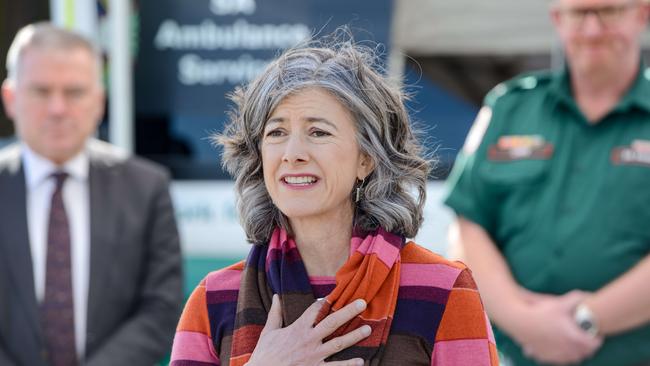Coronavirus’s toxic legacy: Chief public health officer Professor Nicola Spurrier warns COVID-19 is robbing young people of hope
She’s only too aware of COVID-19’s potentially devastating effect on the human body – but SA’s top public health doctor also fears the impact it’s having on young people’s mental health.
Coronavirus
Don't miss out on the headlines from Coronavirus. Followed categories will be added to My News.
- Read part 1 of Andrew Hough’s interview with Professor Spurrier
- All the latest local and international coronavirus updates
The coronavirus pandemic is causing South Australia’s youth to live without hope amid fears future generations will battle chronic unemployment and financial insecurity, the state’s top public health doctor warns.
In an exclusive interview, chief public health officer, Professor Nicola Spurrier, said one of her major concerns was how the COVID-19 crisis was “impacting young people”.
Prof Spurrier, a paediatrician and mother of three, said it was important to provide “that sense of hope that things will go back to normal, they can do the things that they like doing … can be planning to have a job, buy a house some day and not (be) impacted”.
As new official figures show thousands of South Australian adults feel significant emotional troubles, she said authorities were acutely aware about being “very careful” when deciding whether to reimpose virus restrictions.

Having warned that COVID-19 would not disappear for the “foreseeable future”, she urged people to look after their mental and physical health.
“The one thing that really has concerned me is the impact on young people,” she said.
“On employment, that not having that hope for the future because it’s all this unknown and they are about to start their lives and get out and hope to get a job and suchlike.
“So we have to be very careful when we put (any) restrictions on, to be doing that in a measured way.
“Because if our economy is not ticking along it has a big impact on people’s health and wellbeing.”
Australian Bureau of Statistics published last month showed SA’s seasonally adjusted unemployment rate rose from 7.9 per cent in May to 8.8 per cent in June – the highest in the nation. Youth unemployment rate was 17.1 per cent – second only to Queensland.
“You look at the number of unemployed people and the impact that has had on them,” Prof Spurrier said.
“I’ve got two older children, (aged) 21 and 19. They are looking to their future and they don’t know what (it) holds.”
Prof Spurrier said the state had been “fortunate to have the low levels we have opened up our society”, which had been very important for the economy and community spirit.
“(It’s) good for people’s mental health, to be able to get out and about,” she said.
The South Australian Population Health Survey, conducted by Wellbeing SA since 2002, has for the past several months asked virus-related questions to gauge any community effects.
June’s survey found almost one in five adults suffered “psychological distress” in the wake of widespread virus-fuelled social and financial problems – a slight increase on May.
Wellbeing SA chief executive Lyn Dean said the survey’s results helped officials decide which services and programs to fund while “highlighting any areas of concern”.
“When COVID-19 restrictions commenced we anticipated that there may be an impact on people’s wellbeing,” she said.
SA Health has launched a new website to provide families with help to stay healthy, active and connected: OpenYourWorld.sa.gov.au
